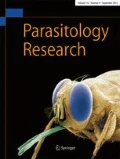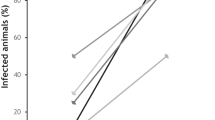Abstract.
Behavioural dominance relationships in mouse populations are based upon fighting and antagonistic behaviour. Social rank is affected by the physiological states present in the mice. Experimental infection by Taenia crassiceps cysticerci induced physiological disorders and disrupted the dominant-subordinate status. Infected male mice showed strong perturbations in territorial behaviour and aggressiveness. Infected dominant male mice did not show a significant reversal of dominance order compared to uninfected mice. In addition, during confrontation between naive infected and healthy mice, infected animals more often assumed a subordinate status than healthy ones. The effects of the infection by T. crassiceps were more likely to prevent adult male mice from becoming behaviourally dominant than to reverse existing dominance relationships. The results are discussed on the basis of the parasite manipulation hypothesis and host optimal foraging and decision-making theories.
Similar content being viewed by others
Author information
Authors and Affiliations
Additional information
Electronic Publication
Rights and permissions
About this article
Cite this article
Gourbal, .B., Lacroix, .A. & Gabrion, .C. Behavioural dominance and Taenia crassiceps parasitism in BALB/c male mice. Parasitol Res 88, 912–917 (2002). https://doi.org/10.1007/s00436-002-0691-7
Received:
Accepted:
Issue Date:
DOI: https://doi.org/10.1007/s00436-002-0691-7




